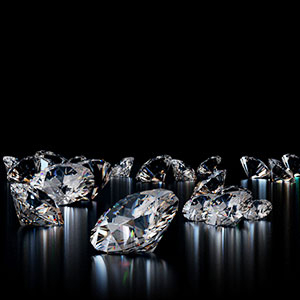
The U.S. Treasury’s Office of Foreign Assets Control (OFAC) has issued two general licenses that will allow the import of previously banned “grandfathered” diamonds in the United States.
The term “grandfathered” refers to rough or polished diamonds that were mined in Russia or whose origin cannot be determined, but were purchased prior to the implementation of Russian diamond sanctions on March 1, 2024. Under past rules, many of those gems were not allowed to be imported into the United States.
These two new licenses change that. The first—general license 103—applies only to diamond jewelry and basically allows the import of all pieces purchased prior to March 1.
“Think of it as a permission slip,” says Sara Yood, president and CEO of the Jewelers Vigilance Committee. “If you have diamond jewelry that was located outside the Russian Federation before March 1, you can import that into the United States.”
The second type of license, No. 104, applies to loose diamonds and is somewhat stricter. It allows for the import of nonindustrial loose diamonds with a weight of 1 ct. or greater that were purchased prior to March 1, as well as nonindustrial diamonds weighing at least half a carat bought before Sept. 1.
At press time, it wasn’t clear whether importers would have to show proof of when their diamonds or diamond jewelry were purchased, says Yood. Possible documentation could include grading reports, appraisals, or sales receipts.
U.S. sanctions on Russian diamonds are due to expand on Sept. 1, to include rough and polished diamonds weighing half a carat and above. The current sanctions, which were enacted on March 1, affect only diamonds of 1 ct. or more. (There’s been an effective ban on direct imports of Russian rough and polished since 2022.)
In advance of the March 1 ban, the U.S. government said that importers would be allowed to “self-certify” their goods’ provenance. While that standard is not as strict as the rules imposed by other countries, there has been no indication that the U.S. will toughen its requirements in September.
Yood cautions importers that they shouldn’t try to use this seemingly weak requirement as a way to evade sanctions.
“Lying to the federal government about the origin of your goods can get you into real trouble,” she says. “I can’t recommend it.”
The new U.S. position on grandfathering is similar to one recently adopted by the European Union.
“This specifically addresses many of the concerns that people in the industry have raised about heritage pieces and repairs,” says Yood. “The industry should see this as the government responding to their needs, especially at a time when the industry is facing a lot of challenges.”
(Photo: Getty Images)
- Subscribe to the JCK News Daily
- Subscribe to the JCK Special Report
- Follow JCK on Instagram: @jckmagazine
- Follow JCK on X: @jckmagazine
- Follow JCK on Facebook: @jckmagazine







